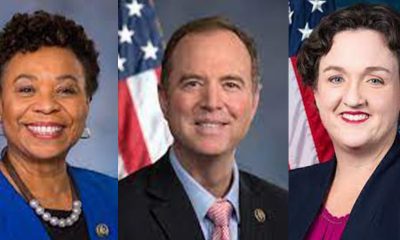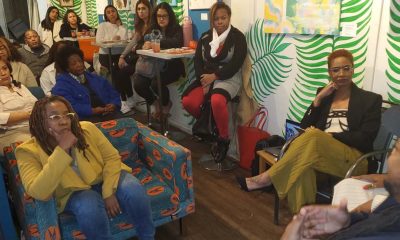Politics
On 50th Anniversary, Medicare and Medicaid Still Vital
By Jazelle Hunt
NNPA Washington Correspondent
WASHINGTON (NNPA) — As Medicare and Medicaid turn 50 this week, the nation takes a look at the impact of two of the most significant government programs ever launched.
Medicare serves roughly 52 million Americans as of 2013, about 10 percent of whom are Black. The program is part of the Social Security Act and was created to provide health insurance for seniors regardless of income or health status. Today, Medicare covers seniors, permanently disabled people of all ages, and people with Lou Gehrig’s disease (ALS) or end-stage kidney disease.
“Medicare in the African American community [has] been a lifesaver,” said Karyne Jones, president and CEO of the National Caucus and Center on Black Aging. “Without it, a very large majority of Black seniors wouldn’t have any health care. As a result of … all of those institutional things that occurred, we didn’t have jobs in the ‘40s and ‘50s and even ‘60s that provided [retirement] health care programs or insurance programs. So it’s a blessing.”
The wealth gap is one of the primary reasons Medicare is so instrumental for Black seniors. While most beneficiaries are White, and most have modest fixed incomes, Black beneficiaries often have little to no retirement funds compared to White people. According to the Kaiser Family Foundation, 95 percent of White beneficiaries had retirement savings, close to $90,000 on average. Meanwhile, the average amount saved by the 81 percent of Black beneficiaries who had personal retirement funds was more than $10,000.
Further, pensions have weakened over the last decade through state deficits and penny-pinching corporate policies.
“There was a time when, if you worked for a place for a long, long time, after you retired you could still have some insurance with that company. Those days are gone,” Jones said. “You can imagine what it’s like to work all your life without coverage – as you get older, those chronic diseases start kicking in. And if you’ve not caught them early or been able to maintain them, they’re worse as you get older. And just think, you have no medical coverage, you have no health care? So your life expectancy and the dignity of your life is zero. This is a program that is crucial.”
While policy analysts and politicians agree that Medicare has been one of the nation’s most effective public programs, the logistics of the program are very confusing for both beneficiaries and health care providers.
There’s also the prevalent belief that the program is slowly spiraling out of control.
The Kaiser Family Foundation reports that the program’s $505 billion allotment was 14 percent of the last year’s federal budget. The program regularly overspends its limit, and will only get more expensive; the cost of health care rises each year, millions of Baby Boomers are retiring, and the smaller number of younger workers and payroll taxes from dwindling wages will not be enough to support the Boomers.
Medicaid – Medicare’s equivalent program for low-income Americans – is even more contested in its 50th year.
According to Samantha Artiga, policy analyst for the Kaiser Family Foundation, the racial disparities that make Black seniors reliant on Medicare are the same ones that make Medicaid so vital for Black families and individuals. She points out that Medicaid covers more than half of all Black children and Latino children, and that Black families are much less likely than Whites to have high wages or insurance through their employer.
“Medicaid has really played a pivotal role in helping to fill this gap in coverage,” Artiga said. “And then also, when we’ve done focus groups or interviews with families, we really hear over and over about the raw impact Medicaid has on their lives, in terms of providing a sense of financial security, feeling protected from high medical costs…and ability to focus on other areas of life.”
Originally intended for children, pregnant women, parents on public assistance, the disabled, and impoverished seniors, the Affordable Care Act (ACA) has further expanded the program to cover low-income people regardless of whether they have children.
The ACA tried to require all states to cover these citizens and offered to fully fund the expansion with federal dollars, as states continued to administer the program. Instead, the Supreme Court ruled the expansion mandate unconstitutional, and made it optional for states. As it stands, 19 states have rejected the idea, including almost the entire South (except Arkansas, Kentucky, and West Virginia) the region with the highest concentration of Black Americans in the nation. More than half of all non-elderly Black people still without insurance as of March are Medicaid eligible under the new guidelines, but many live in non-expansion states and will likely remain uninsured because of it.
“There still remains some significant gaps in coverage for low-income adults and these disproportionately impacted Black Americans,” Artiga said. “We’re seeing now, with recent data, declines in uninsured rates since implementation of the ACA, and those declines have been larger for Blacks and Hispanics relative to Whites, suggesting already a beginning of some narrowing of these coverage gaps. But they still remain more likely to be uninsured than Whites.”
Lawmakers and experts assert that Medicaid and Medicare are becoming too inclusive and expensive to sustain. Fraud, abuse, and waste have also become a real problem. These widespread scams charge for services that aren’t actually provided and pocket the federal funds; authorize unnecessary services, or bill necessary ones incorrectly; or administer services to someone other than the beneficiary – sometimes even after the person is deceased. The misuse consumes additional billions in taxpayer money each year.
There are also concerns about insufficient access to specialty care through the program, and the already-strained availability of care providers particularly in rural areas.
Both sides of the political aisle believe the systems need to change – progressives favor tighter security accountability on the current systems, while conservatives advocate a complete overhaul.
Although the programs have both done a great deal to address health care access gaps, Artiga said that government-sponsored health coverage is not a cure-all for ending disparities. Still, the programs have achieved measurable positive outcomes over the past 50 years.
“You don’t want to live in a country where you continue to see an increase of poor, unhealthy people. That drags on the entire system,” Jones said. “I can’t believe that this country still believes that your health should be only as much as you can afford. Medicare and Medicaid stand at the beginning of us at least acknowledging our own humanity. I’m hoping that not only do they expand the benefits, but that they recognize that a healthy America is a prosperous America.”
Activism
Oakland Post: Week of April 24 – 30, 2024
The printed Weekly Edition of the Oakland Post: Week of April 24 – 30, 2024

To enlarge your view of this issue, use the slider, magnifying glass icon or full page icon in the lower right corner of the browser window. ![]()
Bay Area
MAYOR BREED ANNOUNCES $53 MILLION FEDERAL GRANT FOR SAN FRANCISCO’S HOMELESS PROGRAMS
San Francisco, CA – Mayor London N. Breed today announced that the U.S. Department of Housing and Urban Development (HUD) has awarded the city a $53.7 million grant to support efforts to renew and expand critical services and housing for people experiencing homelessness in San Francisco.

FOR IMMEDIATE RELEASE:
Wednesday, January 31, 2024
Contact: Mayor’s Office of Communications, mayorspressoffice@sfgov.org
***PRESS RELEASE***
MAYOR BREED ANNOUNCES $53 MILLION FEDERAL GRANT FOR SAN FRANCISCO’S HOMELESS PROGRAMS
HUD’s Continuum of Care grant will support the City’s range of critical services and programs, including permanent supportive housing, rapid re-housing, and improved access to housing for survivors of domestic violence
San Francisco, CA – Mayor London N. Breed today announced that the U.S. Department of Housing and Urban Development (HUD) has awarded the city a $53.7 million grant to support efforts to renew and expand critical services and housing for people experiencing homelessness in San Francisco.
HUD’s Continuum of Care (CoC) program is designed to support local programs with the goal of ending homelessness for individuals, families, and Transitional Age Youth.
This funding supports the city’s ongoing efforts that have helped more than 15,000 people exit homelessness since 2018 through City programs including direct housing placements and relocation assistance. During that time San Francisco has also increased housing slots by 50%. San Francisco has the most permanent supportive housing of any county in the Bay Area, and the second most slots per capita than any city in the country.
“In San Francisco, we have worked aggressively to increase housing, shelter, and services for people experiencing homelessness, and we are building on these efforts every day,” said Mayor London Breed. “Every day our encampment outreach workers are going out to bring people indoors and our City workers are connecting people to housing and shelter. This support from the federal government is critical and will allow us to serve people in need and address encampments in our neighborhoods.”
The funding towards supporting the renewal projects in San Francisco include financial support for a mix of permanent supportive housing, rapid re-housing, and transitional housing projects. In addition, the CoC award will support Coordinated Entry projects to centralize the City’s various efforts to address homelessness. This includes $2.1 million in funding for the Coordinated Entry system to improve access to housing for youth and survivors of domestic violence.
“This is a good day for San Francisco,” said Shireen McSpadden, executive director of the Department of Homelessness and Supportive Housing. “HUD’s Continuum of Care funding provides vital resources to a diversity of programs and projects that have helped people to stabilize in our community. This funding is a testament to our work and the work of our nonprofit partners.”
The 2024 Continuum of Care Renewal Awards Include:
- $42.2 million for 29 renewal PSH projects that serve chronically homeless, veterans, and youth
- $318,000 for one new PSH project, which will provide 98 affordable homes for low-income seniors in the Richmond District
- $445,00 for one Transitional Housing (TH) project serving youth
- $6.4 million dedicated to four Rapid Rehousing (RRH) projects that serve families, youth, and survivors of domestic violence
- $750,00 for two Homeless Management Information System (HMIS) projects
- $2.1 million for three Coordinated Entry projects that serve families, youth, chronically homeless, and survivors of domestic violence
In addition, the 2023 CoC Planning Grant, now increased to $1,500,000 from $1,250,000, was also approved. Planning grants are submitted non-competitively and may be used to carry out the duties of operating a CoC, such as system evaluation and planning, monitoring, project and system performance improvement, providing trainings, partner collaborations, and conducting the PIT Count.
“We are very appreciative of HUD’s support in fulfilling our funding request for these critically important projects for San Francisco that help so many people trying to exit homelessness,” said Del Seymour, co-chair of the Local Homeless Coordinating Board. “This funding will make a real difference to people seeking services and support in their journey out of homelessness.”
In comparison to last year’s competition, this represents a $770,000 increase in funding, due to a new PSH project that was funded, an increase in some unit type Fair Market Rents (FMRs) and the larger CoC Planning Grant. In a year where more projects had to compete nationally against other communities, this represents a significant increase.
Nationally, HUD awarded nearly $3.16 billion for over 7,000 local homeless housing and service programs including new projects and renewals across the United States.
Activism
Oakland Post: Week of April 17 – 23, 2024
The printed Weekly Edition of the Oakland Post: Week of April 17 – 23, 2024

To enlarge your view of this issue, use the slider, magnifying glass icon or full page icon in the lower right corner of the browser window. ![]()
-

 Activism4 weeks ago
Activism4 weeks agoOakland Post: Week of March 27 – April 2, 2024
-

 #NNPA BlackPress4 weeks ago
#NNPA BlackPress4 weeks agoBeloved Actor and Activist Louis Cameron Gossett Jr. Dies at 87
-

 Community1 week ago
Community1 week agoFinancial Assistance Bill for Descendants of Enslaved Persons to Help Them Purchase, Own, or Maintain a Home
-

 Activism3 weeks ago
Activism3 weeks agoOakland Post: Week of April 3 – 6, 2024
-

 Business1 week ago
Business1 week agoV.P. Kamala Harris: Americans With Criminal Records Will Soon Be Eligible for SBA Loans
-

 Activism2 weeks ago
Activism2 weeks agoOakland Post: Week of April 10 – 16, 2024
-

 Community1 week ago
Community1 week agoAG Bonta Says Oakland School Leaders Should Comply with State Laws to Avoid ‘Disparate Harm’ When Closing or Merging Schools
-

 Community6 days ago
Community6 days agoOakland WNBA Player to be Inducted Into Hall of Fame


























































